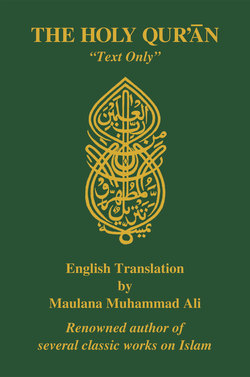Читать книгу The Holy Quran, English Translation, âText Onlyâ - Maulana Muhammad Ali - Страница 69
На сайте Литреса книга снята с продажи.
Chapter 4 Al-Nisa’: The Women
Оглавление(Revealed at Madinah: 24 sections; 176 verses)
This chapter is named The Women because it deals chiefly with the rights of women.
The connection of the last chapter with this one lies in the fact that that chapter deals with the battle of Uhud, while this one deals with the circumstances to which the battle had given rise. For the decimation of the Muslim force had left a large number of orphans and widows to be looked after, and it is with duties towards these two classes that the chapter opens. The two chief features of the battle of Uhud were, the death of a large number of Muslims and the desertion of hypocrites; while, following it, were circumstances which brought about a final rupture with the Jews, and it is with these three subjects that the chapter deals.
The opening section lays down injunctions relating to the duties of guardians towards their orphan wards. The second section brings woman to a status of equality with man, and lays down a new law of inheritance, for among the Arabs a woman had no right to inherit the property of a deceased relative. The third section deals with the treatment of women in general and denounces the practice of claiming women as a part of inheritance. The fourth section discusses what women may not be taken in marriage, and the fifth gives them the right of disposing of their earnings as they please; while the sixth first points out the remedy when there is a disagreement between the husband and the wife and then inculcates the principle of charity in general, introducing the subject of hypocrisy towards its close.
After having laid stress, in the seventh and the eighth sections, upon external as well as internal purity, showing how the Jews had neglected the latter of these and how, for no other reason than envy of the Muslims, they had sided with the polytheists, and after having enjoined upon the Muslims to be strictly firm in justice, we are led on in the ninth section to the dealings of the hypocrites who had refused to accept the Prophet’s judgment in going out to meet the enemy. We are then told in the tenth section that the question of war was a question of life and death for the Muslims. The eleventh section deals with the attitude of the hypocrites, and the twelfth shows how waverers are to be dealt with. The thirteenth states when and to what extent the murderer of a Muslim is excusable, because it was very often by treachery or hypocrisy that the Muslims were killed. The fourteenth shows that those Muslims who were compelled to remain with the enemy against their own wishes were excusable. The fifteenth warns the Muslims against being surprised in battle when saying their prayers. The sixteenth and the seventeenth refer to the secret counsels of the hypocrites. The eighteenth condemns idolatry, because it is the idolatrous hypocrites that are spoken of throughout the previous sections, and the subject is thus brought to a close.
Previous to the introduction of the third chief subject of this chapter there is a reversion in the nineteenth section to equitable dealings with orphans and women, and the subject is generalized in the twentieth; while in the same section the hypocrites from among the Jews are dealt with. The next predicts their end, at the same time showing that belief in previous prophets could do them no good if they rejected the Holy Prophet. The twenty-second speaks of their transgressions and of their false allegations regarding the death of Jesus on the cross. The twenty-third section tells them that the whole of the previous prophecy pointed to the appearance of the Holy Prophet Muhammad, while the last one, after referring briefly to the Christian error in deifying Jesus, closes with a reversion to the subject of inheritance.
As this chapter treats of many of the questions arising out of the battle of Uhud, there seems to be little doubt that it was revealed immediately after that battle. And thus, as in arrangement so in the order of revelation, it follows the last chapter. The main portion of it thus belongs to the fourth year of the Hijrah, while there is no reason to deny that some portions may have been revealed towards the close of the third or the beginning of the fifth year. Noeldeke’s suggestion, however, that vv.115–125 and 130–132 belong to Makkan revelation, based as it is on the mere fact that the Jews are there “referred to in a friendly spirit”, is quite wrong, because, as shown in 3:115a and elsewhere, the Holy Prophet was fair to the Jews even when they were most inimical to him, and the verses referred to therefore belong to the fourth or the fifth year of the Hijrah.
